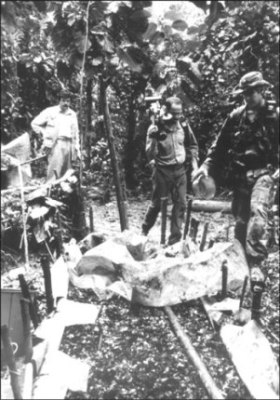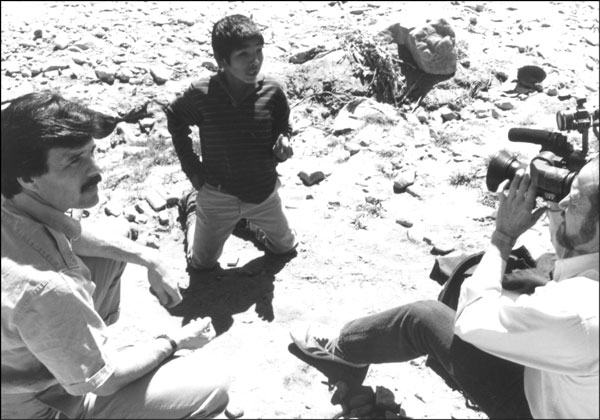Warrior Pose (12 page)
Authors: Brad Willis


Coca Drug Lab, Bolivia, 1989.
The paste from the jungle labs is smuggled down the mountain into cities such as Cochabamba. Here, it's refined into pure cocaine and eventually smuggled worldwide. Like most drug-refining cities, Cochabamba is host to powerful cartels who bribe and intimidate local officials. Finding a lab here would be next to impossible, even for the strike force. We part company with the soldiers and decide to illustrate what
basuco
is doing to the local culture in Cochabamba, which is also a haven for low-level drug dealers. They hook young street orphans on smoking
basuco
, use them to deliver drugs, and force them into prostitution. Some of the children are barely five years old.
We find these children early one morning in a dry riverbed that threads through the city. They're living in holes they've dug in the clay with their hands. They work in the city from shortly after sunrise to sunset for the dealers, then crawl into their holes at night to smoke
basuco
, the only pay they receive. Within a few years, the toxic paste destroys their nervous systems. Most of them never make it to their teens.
We film an interview with a boy named Alejandro, clearly the dean of the riverbed. He is twelve years old, but he's so small and thin that he barely looks eight. The dark circles around his eyes are haunting. And the
basuco
has given him a form of palsy. It's painful to watch him struggle to coordinate his spasmodic arms and head as he fills his pipe, fights to get the stem between his lips, lights it, and sucks in a long hit.
“My parents threw me on the streets when I was five. I was the youngest of many brothers and sisters. They could not afford to feed me,” says Alejandro as he exhales a plume of deadly smoke that eerily wisps around his face.
His words are garbled and hard for our interpreter to understand, but a deep intelligence still manages to come through. “This is my home. I have lived here seven years. Longer than anyone else. I know I'm dying now. I don't care. All I want is my
basuco
. They can push the clay over me when I'm dead.” With his head shaking, hands quivering, and eyes spasming, Alejandro takes another hit and drifts off into a world of his own. As we say good-bye, I wish I could lift this boy out of his hole in the riverbed, carry him in my arms to an airplane, whisk him home, help him recover, and give him a new life.

With Alejandro in Cochabamba, Bolivia, 1990.

My final day in South America, still in Cochabamba, Bolivia, I feel my back catching on fire again. I still have some Motrin, but I'm out of Valium. I'm on a major story far from home, and so the prospect of a serious flare-up scares me to death. I find a drugstore that looks more like a corner newsstand, with a half-dozen sheets of Valium pills sitting on an outdoor table by the entryway, each encapsulated in a little plastic bubble. The sheets hold two dozen pills apiece and cost next to nothing, and I don't need a prescription here. I buy them all and quickly punch three or four from one sheet and dissolve them
under my tongue, anxious to get the muscle-relaxing drug into my bloodstream as quickly as possible.
Within fifteen minutes, my body begins to feel like jelly. I'm a little woozy as Dennis and I sit down to dinner. After a few glasses of wine, the pain is only a memory. This is such a logical and necessary course of action that if you told me it looked like Alejandro and I had something in common, I'd think you were out of your mind.

CHAPTER 7
30 Rock
S
PRING OF 1990 BRINGS another bitter Boston winter to an end. Thousands of cherry trees blossom throughout the city in brilliant hues of pink. I'm at my desk, leaning as far back as possible in my chair without falling over. This takes the pressure off my back as I gaze out the window at my favorite cherry tree glistening in the midday sunlight. A hummingbird hovers at one blossom, drinks nectar, then zips away in a flash.
“Willis, come to my office!” Stan Hopkins firmly calls out from across the newsroom, breaking my reverie. It's a tone I've never heard from him.
“Sure, I'll be right there,” I respond, getting up from my desk and taking my usual pause: pressing my palms into my lower back, rolling my shoulders a few times, checking in on the pain, and reassuring myself I'm ready for any new assignment Stan might want to discuss. But his tone was strange, and I wonder if something is wrong.
Stan pauses deliberately as we sit down in his office. My mind races through the possibilities. The news budget is being slashed. He's been fired. Orâ¦they've found out about my back problem and I'm being benched. I can't take it anymore and ask, “Is everything all right?”
He regards me with a sober face. “I've got a problem with you,” he says. This puts me over the edge
. It's my back. Somehow the news got out.
I stare at my feet, about to admit the whole thing before he says another word. Then Stan smiles. He says, “Don Browne just called. He's now the executive news director of NBC News. He wants my permission to offer you a job.”
NBC News.
A rush of joy explodes throughout my entire body.
This is it. I've finally made it.
Then I remember the network always seeks to cultivate good relations with its local affiliates, especially a powerhouse like WBZ-TV. If Stan tells Don Browne he'd rather keep me in Boston, there won't be any job offer.
“You're a top reporter,” Stan says. “You have a great career here. I'd like you to stay around.”
My heart starts to sink, but then he smiles again.
“But I'm not going to hold you back. Do you need time to think about this?”
About as long as it takes to exhale. “Stan, you're the best news director I've ever worked for, and a great friend. You've supported me in every way, even put your career on the line for me. I'll never forget it, but this is the only thing I've wanted since I first set foot in a newsroom.”
“I thought so,” he replies. “I already told Don it's okay to move forward. Here's his number. Go give him a call.” I wisely repress the urge to jump up screaming with delight and run back to my desk, bad back and all.

It takes a month before Don Browne can see me at NBC headquarters at 30 Rockefeller Center in Manhattan. It's the longest month of my life and I get antsier by the minute until the day finally comes. The shuttle flight from Boston to New York is always a quick trip, but I want to ask the pilot to step on it. As the New York skyline comes into view from my window, it feels like the plane will never land. I anxiously deplane at La Guardia airport, rush down the endless corridors, and see a chauffeur holding a little white sign with my name neatly printed on it as if I'm someone important. It's almost impossible for me to believe what's happening.
The driver is clad in a black suit with a white shirt and black tie. He takes my luggage and politely guides me to his sleek, black limo sedan, opens the back door for me so I can slide onto the plush seat as he places my bag in the trunk. We listen to classical music as he cruises toward Manhattan. As we cross the Triborough Bridge, I feel a rush. I'm so close to fulfilling my dream I can taste it. As we pull up to the Omni Berkshire Palace Hotel on West 52nd in Midtown, just a few blocks from NBC, I almost float out of the limo.
The Omni is a hotel of understated elegance, dignity, and decor. The impeccable concierge lets me know that the room, meals, and incidentals are covered by NBC and to call him if I need anything. He tells me to enjoy the stay, and I almost blurt out “No problem,” then remember how dignified this place is and politely thank him. A bell captain promptly guides me to a luxurious suite. I'd love to go out on the town, but I order room service instead to save my back for the big meeting in the morning. Then I click on the TV just as
NBC Nightly News
begins.
“Good evening. I'm Tom Brokaw. Topping the news tonight⦔
I can hardly believe this is really happening. I'm a kid from a middle-class family who fled the suburbs, tried to drop out of the whole world, went to an obscure state college, and one day drove into the parking lot of a small-market TV station on a whim. I'm now in a swanky hotel in the Big Apple, awaiting filet mignon with gorgonzola sauce, julienned carrots with green beans, and a pricey bottle of vintage cabernet, on the cusp of a dream-come-true.

